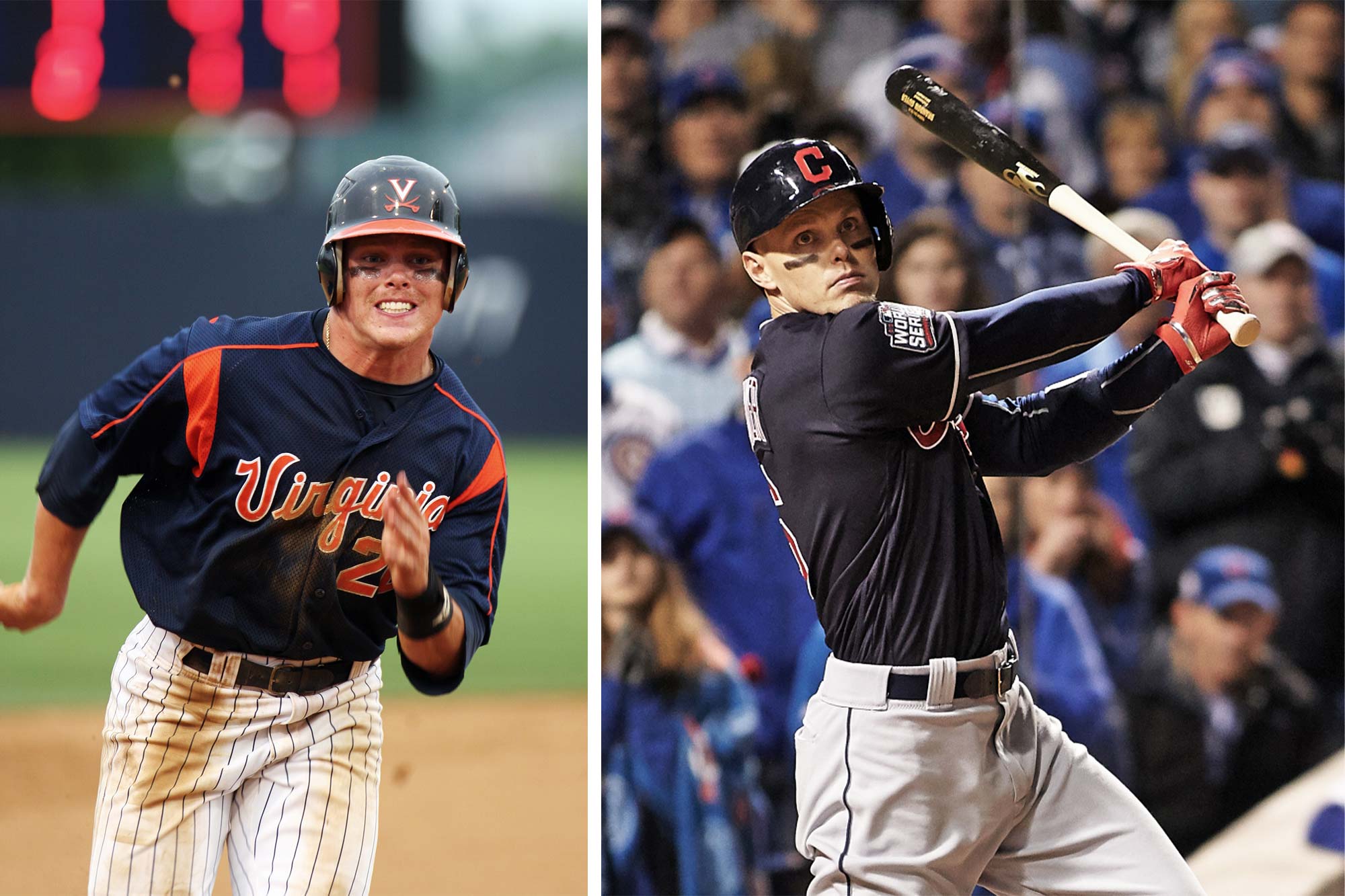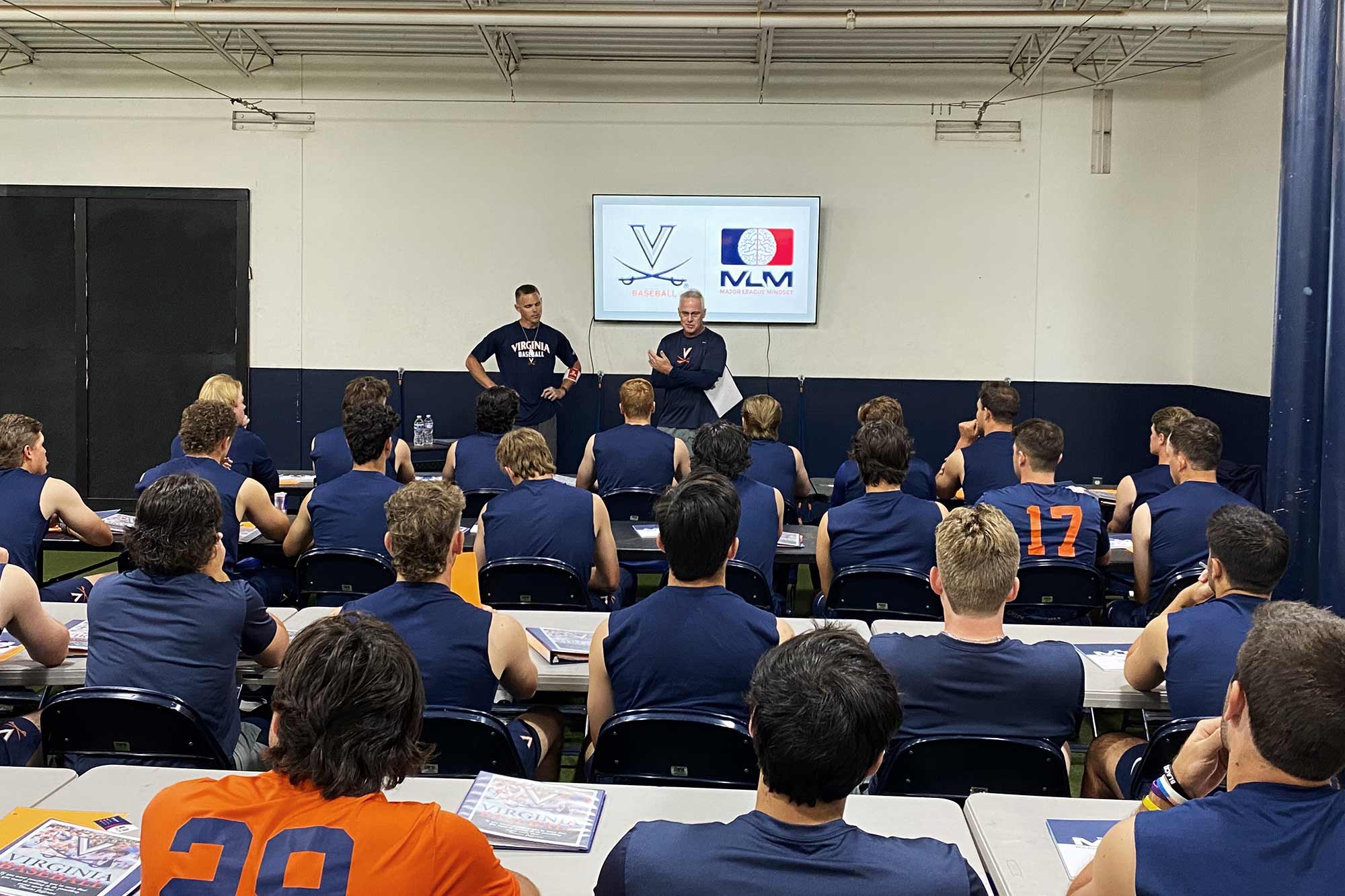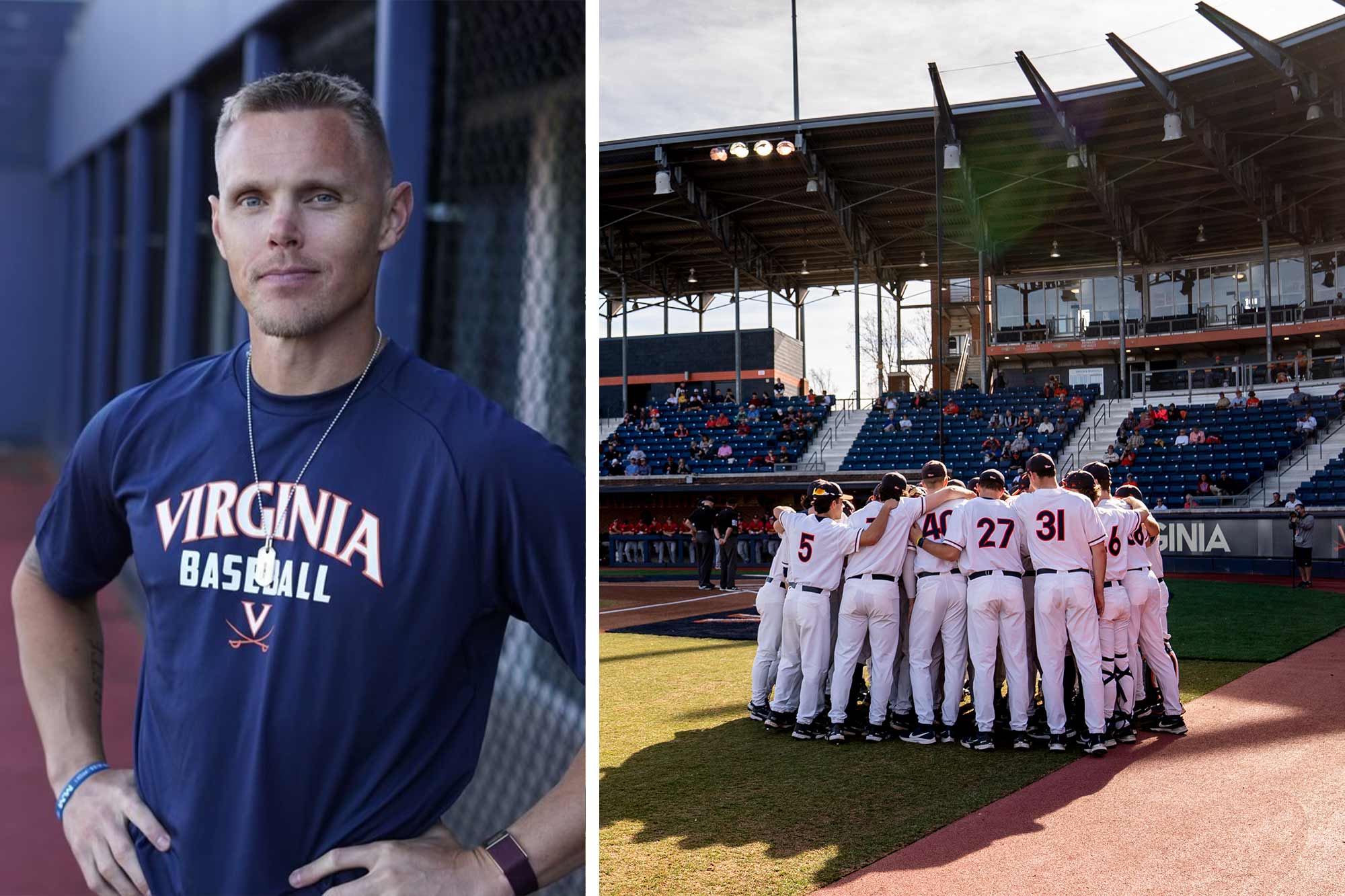Between his time at the University of Virginia and seven seasons in Major League Baseball, Brandon Guyer stepped to the plate in a game 2,262 times.
But only once did he do it in front of 38,104 stadium spectators, with more than 40 million watching on television, while facing one of the game’s hardest-throwing pitchers in the eighth inning of a deciding Game 7 of a World Series with two outs and one runner on base. Guyer’s Cleveland Indians were losing to the Chicago Cubs, 6-3.
So it’s easy to believe Guyer when, looking back at his November 2016 at-bat against the Cubs’ Aroldis Chapman, he says his heart was beating out of his chest.
“I got that nervous anxiety,” Guyer said.
Instead of succumbing to the pressure, however, Guyer delivered on the big stage, driving Chapman’s 99 mph fastball to right-center field for an RBI double. A batter later, Cleveland’s Raji Davis tied the game with a home run.
Though it came in a losing effort – the Cubs eventually won, 8-7, in 10 innings – Guyer’s clutch hit six years ago was the signature play of his professional career. His approach to that moment provides a perfect example of what he’s preaching now to baseball and softball players of all levels, including those at his alma mater.
Guyer, who retired from his playing career in 2020, is the founder of Major League Mindset, a detailed mental skills training program designed to, among other things, trigger confidence for individuals in intense situations. It’s a system based off real-life experiences.
Though Guyer had never faced Chapman – who holds the Guinness World Record for fastest pitch ever thrown (105.1 mph) – before that at-bat on Nov. 2, 2016, he had visualized the encounter.
“Everything happens twice – first in our mind, and then second in real life,” Guyer said. “And it’s been scientifically proven that what we vividly imagine and what we physically do is the same thing.
“I had put myself in that situation through visualization hundreds of times. Now, that doesn’t mean you’re going to succeed, but it means you’re doing your part, everything you possibly can, to put yourself in the best position to succeed.”

Guyer’s trust in visualization dates to his days at Herndon High School in Northern Virginia. Approaching the end of his junior year without a college scholarship offer, Guyer, a self-admitted underperformer, read, by request of his high school coach, “Heads-Up Baseball: Playing the Game One Pitch at a Time,” by renowned sports psychologist Ken Ravizza.
The fact that Guyer went on to receive an offer from UVA that summer after making huge improvements to his game wasn’t a coincidence, he said. Ravizza’s mental skills lessons stuck with him through his Cavalier career – where he made first-team All-Atlantic Coast Conference as a junior in 2007 and was later inducted into the program’s hall of fame – and his time in MLB – where he played for the Indians and Tampa Bay Rays, twice leading the American League in hit-by-pitches.
“I strongly believe that physical skills plus mental skills equals a ballplayer’s true potential unlocked,” Guyer said. “So I continued to train my mind and body throughout my whole career.
“I had the fear, I had the anxiety, I had the stress, I had doubt – all emotions and obstacles that all players of all ages deal with. And training the mindset is really what helped me deal with them and break through.”

He’s now seeking to pay forward what he’s learned.
Veteran UVA baseball coach Brian O’Connor, who made Guyer part of his first recruiting class in 2003, recently added the 36-year-old to his staff as a player consultant. Guyer, over a series of virtual and in-person sessions, is tailoring his Major League Mindset system specifically to the Wahoos program.
“There’s a ton of college teams out there doing this with different people in this space,” O’Connor said of mental training. “Brandon just happens to be one of the more popular names in this space – and he wore our uniform. So, for our players, I think it’s pretty cool that they can get the tools to help them in this area from someone who walked in their shoes 16 years ago.”
O’Connor, joined by the other members of Virginia baseball staff at the time, was at Cleveland’s Progressive Field for Guyer’s big hit against Chapman. While O’Connor admitted he was “going crazy” like the rest of the fans in that stadium, he was hardly shocked by Guyer’s resilience in the moment.
Our staff is excited to be in Cleveland to support UVA alum @BrandonGuyer for Game 7 of the World Series! pic.twitter.com/o3dPYEikBz
— Brian O'Connor (@UVACoachOConnor) November 3, 2016
“I had pride more than anything,” O’Connor said. “Brandon Guyer was an incredibly hard-nosed player. I remember when he ran through the wall in left field here, back when the wall was wood. This guy scored seven touchdowns one time in a high school football game.
“So it didn’t surprise me that he stepped up in that moment and did what he did. It’s right in line with who he was as a competitor and a player.”
O’Connor sees that drive continuing for Guyer in his new venture.
“Now that he’s no longer a player,” O’Connor continued, “he’s able to not only impart the wisdom, but it’s a way for him to compete and feel like he’s part of something to help someone to be better.”
Guyer confirmed the notion.
“I’m here to help individual players on the UVA baseball team and help the team in general close the gap,” Guyer said. “And that gap is who they’re capable of being in any given moment and who they’re actually being.
“If they can close that gap, what happens? Each player shows up at their best more consistently. And then, as a team, they play up to their full potential.”
That’s a wrap on a great trip to Cville! #grateful *
— Brandon Guyer (@BrandonGuyer) September 25, 2022
: @NeXupBaseball @bramiography @BUSShowcase pic.twitter.com/8HYcPNCH0Y
Media Contact
University News Senior Associate University Communications
fpa5up@virginia.edu (434) 924-6856
Article Information
September 21, 2025




